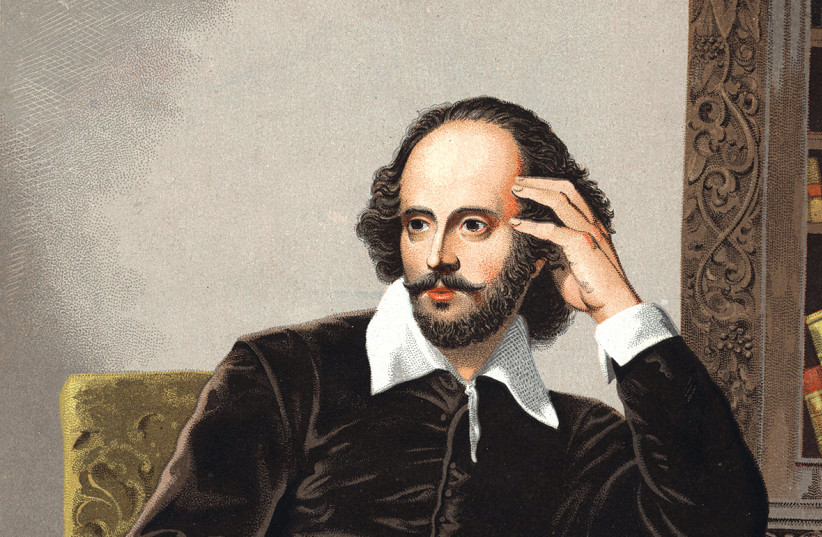Evegnia Dodina, wearing white face paint and a masculine suit, turns a black cross upside down during Gesher Theater’s performance of Shakespeare’s Richard the III, after confessing she has “much life to live before I reach the goal” of wearing the crown. Richard, whom she incarnates, has copious amounts of blood to spill before he is slain, and we will see much of it.
As in a horror movie, the upside-down cross conjures a murderer (Shlomi Bertonov) who melts the bodies of children into plastic buckets as a banquet is held near a severed head (Alexander Senderovich as Hastings) for a ruler condemned by “a thousand several tongues” as evil. For Shakespeare’s generation, Richard III rested on “England’s lawful Earth unlawfully made drunk with innocents’ blood.”
The historical Richard, the last English king of the House of York – who died in combat during the 1485 Battle of Bosworth Field – was described by Sir Thomas Moore as a blood-thirsty, immoral ruler. His demise spelled the rise of the House of Tudor, championed by the Earl of Richmond, who became King Henry VII.
The myth was that the Wars of the Roses between the House of York and the House of Lancaster were divine punishment for England’s sins. Therefore it was the House of Tudor that was preordained to rule. Famous Tudors were King Henry VIII (whom Moore served) and his daughter Elizabeth I (under whom Shakespeare lived).
When the young Prince of Wales (Noam Tal in a spirited performance), speaks to his uncle, Richard, about capturing land in France when he grows up, he is referring to an ideology that rapidly went out of fashion by 1592 when the play was written. English claims on French soil would end during Queen Elizabeth I’s reign to be replaced by commerce, industry, and empire-building on more distant shores.

An illustration of the lust for power in Israel
Director Itai Tiran removes the historical Earl of Richmond from his production, as well as many of the historical elements, distilling it into a precise, clear illustration of the lust for power and the machinery of state at this time in the history of Israel.
AS WE take our seats, we see several actors painting on a wall that bears Richard’s name. When the performance begins, the wall goes blank. After he is crowned, the name reappears. The play becomes a never-ending cycle of blood, powered by Israeli songs.
If the 1955 classic film with Laurence Olivier offers a rich adaptation of the work still grounded in its place and time, Tiran offers a bleaker view and dispenses with the historical and geographic location.
When King Edward IV (Doron Tavori) is at the center of an Israeli folk dance, Richard, then still only the king’s brother (Dodina) sits outside of it. With her petite frame and powerful Russian-accented Hebrew, Dodina lends her Richard a tripled sense of otherness. Richard is “determined to prove a villain” because of his physical and mental flaws.
Dodina is physically similar to the original Richard, as forensic studies show he was petite and feminine in shape.
The gender-crossing does not end there. Tavori also plays his own mother, the Duchess of York. When the aged woman holds the face of Richard, her last living son as he heads to war, she cries: “Bloody thou art, bloody will be thy end; shame serves thy life and doth thy death attend.”
Richard (Dodina), on a wooden horse, weeps. It is the only instance in which we can believe that he sheds true tears. Dodina’s genius is well-served by inspired casting.
Bertonov, whose role fuses two murderers and Tyrrell into one character, excels as a psychopath who calmly spreads plastic sheets before dispatching his victims. He also sings beautifully. Gilad Kletter, who plays Buckingham, employs his brilliant vocal talent to rouse the audience to support Richard’s claim to the throne before he too, is betrayed by the monstrous monarch.
Unlike the men around her (Kletter, Senderovich) Michal Weinberg (another Queen Elizabeth, the widow of King Edward IV) is not fooled by Richard. Her grief over the loss of her children and her hatred of Richard are a powerful display of skill.
Richard and Buckingham sing Hareut, a poem originally written by Haim Gouri to honor the fallen soldiers of this country’s War of Independence as they enjoy dinner with the bleeding head of Hastings on the table next to the cutlery. This is in step with Richard’s promise not to eat until he sees the cut-off head – but it is also a very cynical observation of our own society.
Using a play depicting English rulers five centuries removed from us, Tiran now gifts us with a brilliant vision of how an entire society exclaims “If not to heaven, then hand in hand to hell” – and means it.
Richard III is performed in Hebrew with Hebrew and Russian subtitles. Length, 2 hours and 50 min. with intermission. Wed., Oct. 11, Thu., Oct. 12, Fri., Oct. 13 at 8 p.m. Noga Hall. Tickets range from NIS 125-NIS 340. 9 Yerushalayim Blvd. Tel Aviv. Bookings (03) 515 7000 ext. 2.
